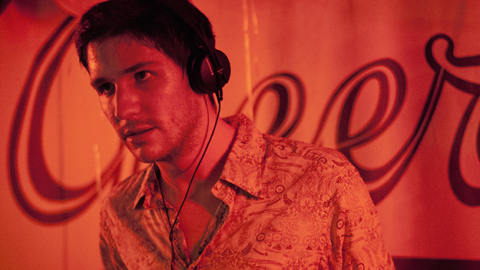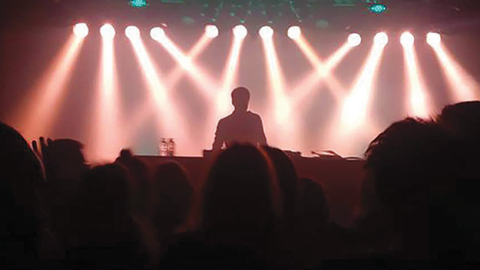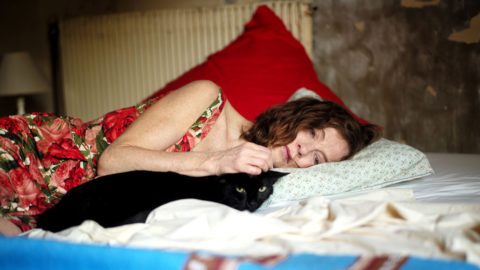Interview: Mia Hansen-Løve
French director Mia Hansen-Love’s films are constantly moving. Not in the way that most films move, with hyperactive frames, whip pans, ginsu-knife editing, careening drone shots, and dramatic musical scores. Hansen-Love doesn’t go in for much of that, though when her camera does move, and when music does come onto the soundtrack, it’s never a minor or meaningless development. In her films, movement is constant in that scenes keep progressing onto the next, never overstaying their welcome. The same goes for her characters—they keep changing before we’re prepared for them to do so, and often before we realize it. In her two first features, All Is Forgiven and Father of My Children, there’s a major narrative rupture that we’re left to recover from. But in recent films like Goodbye First Love and Eden, the movements are subtler, at time even inscrutable, leaving us to long for a present that has only just passed. There’s a methodology to this approach, both in the writing and the editing of her films, but there’s also a philosophy. Time passes, people and relationships evolve, we keep up or we don’t, we feel it or we don’t. And that goes for her characters, her audience, and the filmmaker herself. As the director said during this interview recorded during the Toronto Film Festival last September, she experiences the emotions and implications of her own films intensely while making them.
In her latest, Things to Come, which opens this week, Isabelle Huppert (in her second great performance this month after Paul Verhoeven’s Elle), plays Nathalie Chazeaux, a philosophy professor who navigates a series of major life changes at an age she’d assumed would be more stable. Her work becomes unstable, her mother becomes suddenly ill, and she learns her husband has been cheating on her. On one hand, Hansen-Love is exploring a milieu she knows well—both of her parents were academics, and she was already familiar with many of the texts and thinkers that Nathalie and others headily discuss in the film. But on the other, she’s diving headlong into the psychological and emotional state of a person more than 20 years her senior. In the below conversation, she talked about this and more, about the benefits, dangers, and tactics for coping with ideas such as these, and why she’s not interested in the limits to understanding defined by film. In person she doesn’t come across as somebody who only wants to talk about movies, or to relate everything to her work. As with her movies, and Things to Come in particular, you get the feeling when talking to Hansen-Love that what’s expressed is only a fraction of what could be expressed, that words employed are only a best attempt at communicating. That she’s working in a language that’s not her primary language serves as a useful metaphor for it all. It’s not that she—or we, for that matter—deliberately holds back, it’s that there’s always so much else going on, so much movement beneath the surface.
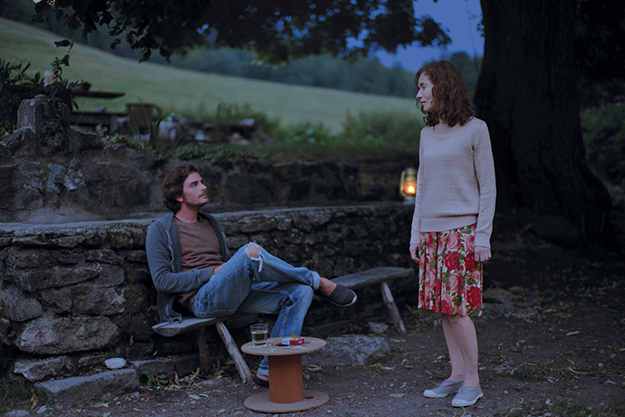
There’s a history of thought around the split between the body and the mind. But in this film, and I think in your films in general, they’re really intertwined.
It’s all together. And that’s maybe what the film is about. When the film starts, there is more of a division between the two, and the character who Isabelle plays thinks she’s really on the side of the soul, of books and ideas. Of course she’s pretty, she gives attention to her clothes and everything, but she really lives for her job, for editing books, for talking about political and abstract ideas, for not only reading philosophy but teaching it. She thinks the flesh is not that important. I think she’s totally sincere when she says to Fabien in the park, “Oh, you know, I have a very rich intellectual life. It’s enough for me.” She’s sincere, but it’s not true. There are two different interior movements in the film. They are almost the opposite, but actually are the same. One is about finding your freedom without depending on anybody. It doesn’t mean the people around you aren’t important, but you need to find an inner life that comes from yourself. You can understand that statement as a rejection of the body, but I think the film is also about reconciling with your body, with your desires. Even though this part is never really said in a literal way in the film, this becomes more palpable as the film progresses. And I think the cat is the conveyor of that. He’s the one who leads her back to Fabien, who is really the person who is both body and soul.
The way that she embraces the cat when the cat comes back—we hadn’t seen her contort her body around another living thing in that way. Such affection, such an object of love.
For me, the cat is like the comeback of the flesh, of the body, of sexuality, of desire. Against her will. I’m telling you this now because the film is over and I’ve spent quite a lot of time thinking about it and getting interviewed, but when I’m making the film I have no idea about any of that. I’m not so self-conscious. It’s afterwards that you start thinking, “Well, what does that mean?” And you realize some things actually mean something. In the film, I think there always is, or should be, an unconscious, things that you aren’t aware of.
Do you shoot this film in sequence?
You can’t, because you have so many scenes in the same place.
Which is that much more impressive, because the film, and Isabelle’s performance, is really constructed around that subtle evolution. The way she becomes slowly more embodied. And not only is she going through a change, but the audience has to change in relation to her. People are changing, time is advancing, and we have to adapt to that change. You’re also asking the audience to adapt to these changes. It’s a real challenge, I think, for the audience. It’s one thing to establish a world for people and a character for people, and then they have that character learn something in the standard arc of a film. You’re asking them to, along with a character, continue to adapt to what’s happening.
By challenge, do you mean it’s similar to how, in Father of My Children, the character suddenly disappears and you have to accept that this is a new situation without this character that you’d gotten used to?
Yes, which is something we deal with all the time in life. But it can feel like a profound rupture in the narrative of a film.
In Father of My Children it’s so sudden, it’s so brutal. In this case the changes are more invisible—slow, small, underground. It’s only at the end that you realize it’s happened.

Something similar happens in Eden, too.
Yes. I think Things to Come has a lot to do with all of my films. One by one I could draw links between this film and all of my films—organic links. Eden and Things to Come are two films that seem to have nothing in common, but for me they are totally connected. Actually when I was preparing Eden, I wrote Things to Come on the side. It’s so completely different in terms of time, acting, issue, subject matter, but I think it’s because I was writing Eden that I could write Things to Come.
Why?
Because I needed to feel connected to youth to deal with this subject of aging. I needed to feel strong. The subject matter of the film—facing difficult situations at a time of your life when it’s really not easy to reinvent yourself and start from scratch—actually terrifies me. It does. I’m not a computer; I’m not a robot. When you make a film about something, whatever it’s about, it affects you. If it’s sad, it makes you sad. I’m really like a child with that, and I guess many artists are. You’ve got to live with it for the two next years, you’ve got to talk about it, it’s going to be part of your life. It exists in the most real way. So when I start working on a film I’ve got to be sure I’m strong enough, that I have what I need in order to face whatever the film is about. More than any of my previous films, this film scared me. I was very pessimistic about the conditions of women, without actually being feminist. Or not that I was aware—maybe I am, I don’t know. I don’t care about the word. But it was a tough film for me, [living with] the brutal truth of what it is for a woman to be left alone when she’s past 50. Now I am 35, and I was 30 or 32 when I wrote the film, and you think you’re not concerned about that. But you actually are. Even I was 17 already I was scared. I was scared for my mother, but also scared as a woman about the human condition. I’m not saying it’s only tough for women, but this is more specific to women. So I wrote this film is because I was working on Eden, a film that, even though it’s very melancholic, is about youth, hype, music, partying, being 20 with everything right in front of you. Because I had this, I could write [Things to Come] on the side. You have these little tricks for dealing with the things you fear.
Yet what’s so valuable about Nathalie as a character is how her navigation of aloneness is also her embracing freedom.
The big thing for me when making a film—and it’s really an extraordinary experience—is feeling that I actually understand why I’m making it, actually experiencing what the character is doing. I’m not talking about private life or anything like that, I’m talking about how it’s a film about how you deal with the void. I was terrified by this idea of facing a story where a character is facing the void. I wrote it without knowing exactly where it was going or what it was saying. And at the end, I realized that just like the character I wasn’t afraid of the void anymore. The void that the film deals with, and the void as I confronted it while doing the film. It was as if the character of Nathalie had taken me by the hand and helped me through it, like somebody who takes you through a forest you’re scared to cross. I experienced my own film, in a way.
And yet the woods are still there. The void is still there. I love that you don’t negate that in the process.
The void is there, of course. It’s about accepting it. You know, there is a film that obsessed me—I don’t even remember it well, but I remember the last scene. I totally identify with to the point that I can’t even say it. It’s the film of Victor Sjöström, called The Wind. It’s about a woman who gets married to a man—I don’t know if it’s her choice or not, but something goes wrong and the man leaves. And it’s about this woman living in a house in the middle of the desert. She wasn’t aware when she got married that she would have to face that. Then a sandstorm arrives, and the sand keeps coming in the house and threatens to kill her. She keeps fighting against it, and the sand goes up and up, and it’s really a metaphor about life, with bad things happening to you constantly. Finally she opens the window and gives herself to the wind. Now I don’t remember if she’s dying, or if it’s a victory, but I have this image of a woman opening the window of her house and giving herself to the wind. Somehow I totally connect with that as an image of both emancipation and resignation. And with the ambivalence of that as a metaphor for life.
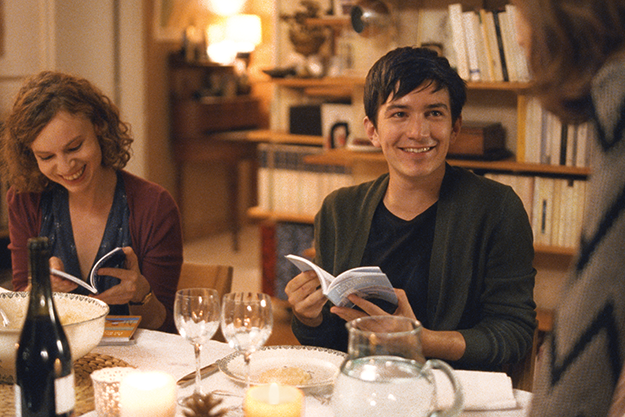
Speaking as somebody who struggles with that void—as I guess everybody does—the acceptance of it is so much more important than expecting it not to be there. Another thing I really appreciate about the film is how, despite her going through invisible changes, as you said, they’re not any more visible to the audience. And I think this is consistent in all of your films. We don’t have any special vantage on what she’s going through, we don’t have any extra piece of information that she gets around to learning.
Yeah, that’s very important. It’s quite determinant in the way I write my stories, but also in the way I edit them. It’s something we almost theorize, my editor and me. It’s the idea that life—the life as we see it onscreen—always has to be before us. In many films, the viewer knows more than the characters about what’s going on, but I think you’re always running after life, time, feelings, people. It’s always happening before you’re aware it’s happening. That desire to transmit a feeling of life instead of a feeling of cinema, as great as it can be, is really determinant for the style of my films, of the mood, of the rhythm. I’m not pretending to be the only one who has these kinds of concerns, but I’m trying to find my own words for them.
I love that phrase, that we’re always running after life. That’s certainly how your films play—we’re often scrambling to catch up.
A scene in a script has a beginning, a middle, and an ending. Very often in films, when scenes begin they look like the beginning, and when a scene is ending it looks like an ending. My editor and I were very keen on trying to edit films so that when we get into the scene, it feels like the scene had already started. And when we get out of the scene, it feels like we have not let the scene end. It has to do with this idea of having the film literally jump into a scene. There is an expression in French, which actually François Truffaut said about films, which is prendre un train en marche. It means “go on a train while the train is already moving.” And that’s how I try to write and edit my films. To always be jumping in a train that’s already moving.
Which loops back to what we were saying just before—it applies to the character’s understanding of herself. She’s her own moving train.
She’s doing the same—she keeps on moving without being aware of where she’s going.
Isabelle Huppert seems to be the perfect person to be embodying that. She’s very active, she’s not passive or overtly withholding, yet you don’t always know what she’s feeling, you don’t always know what she’s thinking. There’s just always a lot going on with her.
During a discussion a few days ago in Telluride, she said, “I don’t like when actors play only their lines.” For her, there is a line and there is what’s behind it. And for me it’s the same. The line is just part of what she has to say, just part of what she thinks or feels. 90% of what’s in mind is not said. Also I think characters can say things and think the contrary. In real life we have trouble speaking our minds. And so it moves to hear characters speak their minds. I’m not saying I don’t care about what they say, or that it has no meaning. I pay a lot of attention [to how characters express themselves]. But I also think that whatever they say, there will be hundreds of things that they didn’t say. [What’s not said] expresses itself through gestures, through voice, through silences, things like that, and you have to try to catch it. For Isabelle it’s the same idea of acting. We had the same instincts, the same approach to how a character should be embodied and come alive.

Though you keep the audience on its toes, so to speak, you’re also not doing what a lot of other films do, which is deliberately hold something back to keep them waiting or guessing. Where the entire script revolves around some piece of information being withheld, and instead of providing a progression of a character, we’re gradually informed of what we could have known in the beginning.
There are two very opposite ways of withholding information. One way is about creating suspense but ultimately delivering information that is nothing more than information. The other way is to make life bigger than cinema. Which is as it should be. Telling a story is about holding back information, but it can have the total opposite meaning, and for the opposite reasons.
So instead of holding back information for a dramatic reveal, you’re holding it back to show that there’s life beyond the margins.
There are holes. Holes exist. It’s not like there’s nothing behind it. I used to make films with these huge time gaps, ellipses. I didn’t feel the need to provide information about what was [left out]. And that was the point. [Asking the audience to] fill these voids and blackouts was part of what the film was about. When I did my first film, All Is Forgiven, it was about a man who did not see his daughter for 20 years. First the film follows him, and then we are with the daughter, who grew up and finds him again. We don’t really know what this man had been doing for so many years. I could have tried to show [what he’d been doing], to put some flashbacks in there, but that would not have made it more true. I think the choice that I made—leaving it like a black hole—actually made it more real, made it really happen. I know that TV is so popular, but the few times that I tried to watch something, I couldn’t connect with it at all because I could feel that the writing was determined by the fact that you have to keep information away from the audience in order to have them come back for the next episode. That’s the opposite of whatever vision I have for what filmmaking is about, which is talking about life, and not just creating dependence.
Eric Hynes is a freelance journalist and critic, and associate film curator at the Museum of the Moving Image in New York.




